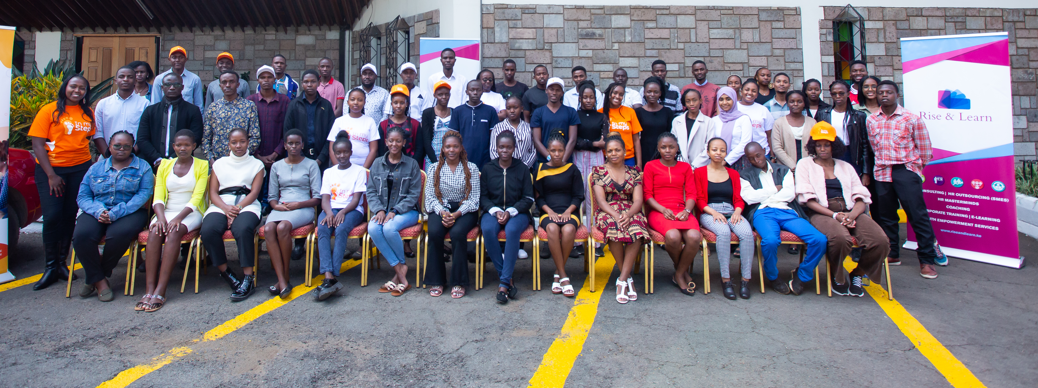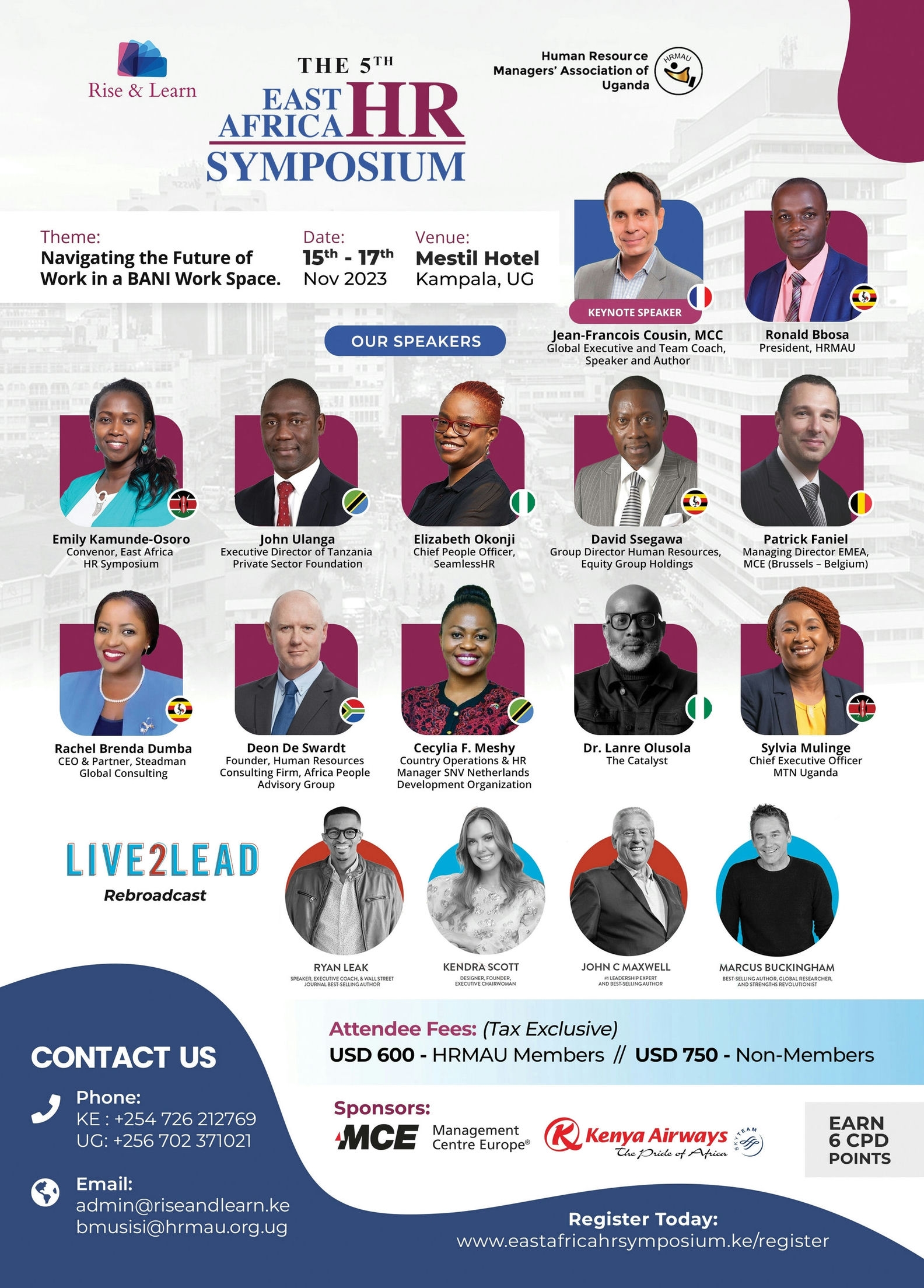THE BEACON Issue 3: Theme: Climate Change and HR – How do Practitioners Fit in?
PONDER THIS
Climate change has been a buzz word for years but has, in recent times, taken a more urgent direction. More data now shows that the rate at which climate change is occurring has increased and with it, the damage to lives and livelihoods. How well do we Human Resource practitioners understand the Sustainable Development Goals (SDGs)? If we were to look through our HR strategies, would we find these SDGs reflected in the initiatives you propose for your organization or clients? The irony is, without paying attention to SDGs, especially Goal No 13which is “tackling Climate Change” ,there will be no world to hire employees for HR practitioners need to insert themselves in this conversation and bring value to the table. This edition is meant to trigger these thoughts
Climate Action and HR: What’s the opportunity for practitioners?

Bernice Nasimiyu HR Professional/ Consultant, Rise & Learn Global
In 2013, the Intergovernmental Panel on Climate Change (IPCC) set up by the World Meteorological Organization (WMO) and the United Nations Environment Programme (UNEP) to provide an objective source of scientific information on climate change, was categorical in its conclusion: climate change is real and human activities, largely the release of polluting gases from burning fossil fuel (coal, oil, gas), is the main cause.
During the recently concluded Inaugural Africa Climate Summit in Nairobi, Kenya’s President, Dr. William Ruto stated: “Climate action is not a Global North issue or a Global South issue. It is our collective challenge, and it affects all of us. We need to come together to find common, global solutions.”
Yet in all these statements of urgency, one gets the uncomfortable feeling that human resource practitioners have steered clear of the climate change discussion. Chances are that this is largely due to a lack of knowledge of what they can do to be part of this global solution.
What Can Human Resource (HR) do to Mitigate Climate Change?
The workspace provides a good platform for the HR professionals to impact the organizations through “Green HR“. This may sound like wishful thinking for now but doable when those entrusted with people matters strategically position themselves to address the challenge.
Green HR refers to the practice of Human Resources focusing on people policies that sustainable practices such as preservation of our environment. Such actions include:
1. Policy Framework
As the strategic leaders and custodians of organizational policies, HR professionals can change the game plan by implementing the following policy issues:
a) Green HR terms and conditions of employment – HR can suggest to add a clause in the employment contract on each employee’s responsibility toward supporting “Green HR’’ practices.
b) Green office standard operating procedures;
- Policy on electronic filling be made mandatory if the organization is still using hard copy files except for the legally mandated filing required by the Kenya employment Act 2007. Reduced printing will save more trees and thus improve on the climate!
- Each employee should be encouraged to become ambassadors of climate change through HR Campaigns & signage messages such as “consider the environment before printing this email” or ‘ Go Green’
- Personal appliances – HR to advocate for the company if budgets allow to buy aluminum or porcelain water bottles as a measure to deter or reduce usage of plastic bottles.
- All providers of in-house office catering events to sign Green HR protocols e.g. on disposables management, use of water dispensers so that staff can use their water bottles or glasses, to eliminate use of disposable plastic bottles or cups.
c) Green HR Office hygiene and maintenance – even though the Occupational Health and Safety Act 2007 provides for safety and hygiene standards in Kenya, the HR professionals can work with the operational and procurement teams to document green hygiene and office maintenance guidelines to save our environment. Such could include documented guidelines on energy and water preservation or waste management.
d) Corporate social responsibility – Many corporates do engage in corporate social responsibilities among them, tree planting.
- Such efforts should be widened to ensure that organizations incorporate such green HR initiatives in their calendar of activities and choose sites to support.
- Employees who are specialists in environmental disciplines should be encouraged to volunteer in schools to train the pupils and students on simple matters of climate mitigation that the learners can even practice in their homes.
2. Green Talent Acquisition Strategies
HR can rally their organizations to adopt talent acquisition strategies that help in climate mitigation such as:
- Rallying thier institutions to use virtual interviews instead of physical in-person interviews for those that still do “traditional” in-person interviews, to reduce the carbon footprint.
- Based on the vacancy, recruitment postings should target staff with added skills that will lead towards sustainability of the organization.
- Personal specification requirement should include specialized skills in climate mitigation or passion in environmental preservation demonstratable through individual, social and corporate actions.
3. Performance Management
HR can rally the revision of the organization’s key performance indicators to include specific measurable indicators towards green performance
- According to a recent research by researchgate.net, ER Navain Sah notes that the first principle of Green Management is the classic “Reduce, Reuse, Recycle” approach. Indeed, a good place for HR to start and craft performance indicators /competencies to measure around sustainability across the whole organization.
- Performance based pay rewards can be reviewed towards better rewards to those that largely contribute to sustainability through green actions.
Way Forward
As practitioner, I will be keenly looking to the three Human resources professional organizations in the country being key stakeholders, (Institute of Human Resource Management, Human Resource Practitioners Examination Body and The College of Human Resource management) to lead the front on Climate Mitigation, through policy guidelines and perhaps including Green HR in the syllabus for Certification of Human Resource practitioners.
Bernice Nasimiyu is a Human Resource Professional/Consultant at Rise & Learn Global
QUICK UPDATES OF GREAT INTEREST TO YOU:
1. InMySteps – Changing Lives, Impacting Young People

InMySteps Internship & Mentorship program is an initiative by Rise & Learn Global that links young people to internships, mentorship and future-ready training. Youth need access to opportunities that enable them to get practical experience.
This program calls on everyone who has walked the professional journey or is able to influence/ support to
extend their hand and pull young professionals up; it is a call to NURTURE. Two cohorts of interns have successfully graduated. The third of 55 interns are currently at placement and mentorship stage.
Read about InMySteps at: https://inmysteps.riseandlearn.ke/
Watch the program documentary on: https://www.youtube.com/watch?v=nTKUcLQq6KE .
Want to be part of this transformational journey by offering your time as a mentor, or donating an internship slot? Please drop an email to Inmysteps@riseandlearn.ke.
2. Rise & Learn Calendar: Read about upcoming events and how to participate!
| Event | Details | How to Participate |
| 5th Annual Regional HR Summit | The biggest, regional HR Summit is happening: Venue: Mestil Hotel Kampala, Uganda Date: 15th – 17th November, 2023 |
Click on this link to register: https://eastafricahrsymposium.ke/register/ |
| InMySteps Annual Run | This run is aimed at raising awareness of the initiative. Venue: Waterfront Karen Date: 10th December 2023 from 6:30am |
Click on this link to register |
FROM THE HORSE’S MOUTH: WE SPEAK TO DR. EDWARD MUNGAI ON HR PRACTITIONERS’ RELEVANCE TO THE CLIMATE CHANGE CONVERSATION:

Dr. Edward Mungai – Thought Leader | Global Sustainability Expert | Certified Executive Leadership Coach
Climate change is a global crisis. Everyone is scrambling to do their bit. In your experience, are HR professionals taking part in this conversation at all?
For many years, the issue of climate change has been viewed through two distinct and, dare I say, polarized lenses. On one side, there were those who dismissed climate change as another alarmist propaganda promoting sensationalism, and on the other, there were those who perceived it as an impending apocalyptic prophecy. Today, a more nuanced understanding of climate change prevails. We are experiencing more frequent and severe weather events. The erratic and unsettling changes in the weather pattern itself makes it clear that climate change is undeniable and warrants concerted efforts to mitigate its effects.
With the realization that climate change not only affects our ecosystem but also our economies, health, and social well-being, individuals, organizations and governments are recognizing the need to do their bit. Keeping this social context in mind, the role of Human Resources has evolved to include the skills to address the challenges arising from the impact of climate change in the workplace.
How can HR participate more effectively in Climate Change discussions and action?
Human resources practitioners have to realign and adapt their functions to the new status quo. From hiring practices, employee engagement, and workforce planning strategies, climate change considerations must now be seamlessly embedded into HR functions among all other aspects of senior management. This will ensure that the SDGs are not just superficial but deeply ingrained in the organization’s DNA.
Additionally, to be effective, HR needs to deploy their dual role as both communicators and advocates. HR professionals must ensure that these goals are effectively conveyed to employees, and they must champion sustainable practices within the organization.
Are HR professionals equipped to spearhead this movement at their workplace?
Traditionally, HR’s functions rely heavily on people-centric expertise, advocacy, communication, and collaboration skills. These skills remain core competencies even as human resources extend to consider climate change. Their people-centric expertise puts them in a unique position to understand and address the human aspect of climate change. This is particularly relevant when considering the impact of climate change on employee well-being and workplace dynamics.
HR needs to leverage the core competencies from their traditional roles. The key distinction is that they must now factor in how climate change impacts their standard practices and make it an integral part of their considerations. Something to note here is that considering climate change may exacerbate competing interests with human resources; for example, HR would need to weigh eco-friendly goals against the need for business continuity.
What are some of the quick initiatives they can take up to push the climate agenda?
HR’s responsibility in talent acquisition can be used to actively seek out individuals with sustainable expertise to assist the organization in reaching its sustainability goals. This involves hiring experts who specialize in areas such as environmental management, renewable energy, or sustainable practices, enriching the organization’s capabilities in addressing climate change. In addition to identifying new talent, Human Resources also carry the responsibility of pinpointing the learning needs of current employees.
This is crucial to facilitate their transition towards acquiring sustainable expertise, which, when integrated into their skillset, allows them to contribute more effectively to the organization’s climate change initiatives. Also, HR remains the guardian of employee well-being in the face of climate change. This extended responsibility encompasses developing comprehensive disaster response and recovery plans, which addresses physical safety ,emotional and mental well-being of employees in the aftermath of climate-related events.
Recognizing the profound health impacts of climate change, HR must further incorporate health & safety protocols, and regulations into its practices. This may entail offering flexible work arrangements and secure employee well-being in the event of extreme weather conditions. Safety policies also need to be tailored for climate considerations, including evacuation plans, extreme weather safety instructions, and ensuring that employees have access to essential resources during emergencies.
Beyond physical safety, HR also assumes the mantle of spearheading employee training and awareness regarding the risks posed by climate change. By providing education, HR enhances employee safety and contributes to the creation of a climate-conscious culture within the organization. In this way, HR stands as the vanguard of an evolving workplace that values its employees’ welfare and the future of our planet.
How can HR bodies/societies support HRs to support action for climate change?
HR bodies and societies can provide valuable support to HR professionals in their endeavors to advance the climate change agenda. They can organize and facilitate educational programs aimed at raising awareness about climate change, sustainability, and environmental best practices. Through workshops, seminars, and training sessions, HR bodies can equip HR professionals with the knowledge and skills necessary to address climate change issues within their organizations. These educational initiatives are crucial for building the foundation of climate-conscious HR practices.
HR societies can also spearhead research on how climate change impacts the workforce and offer valuable resources to help HR professionals make informed decisions. These resources may include toolkits, reports, and case studies, providing practical insights and actionable strategies for addressing climate change. By staying informed about the latest research findings, HR professionals can adapt their practices to align with the evolving landscape of climate change.
Parting shot?
As we move forward in the era of climate consciousness, many aspects of business management will continue to evolve and adapt their functions to meet the challenges presented by climate change.HR professionals can ensure they adapt to these changes by looking for knowledge, resources, and connections needed to lead their organizations toward a more sustainable and environmentally responsible future.
For the Laughs 🙂
- What do you call monies generated by a carbon tax? Climate Change
- These climate change activists need to relax, I don’t have a carbon footprint: I Just drive everywhere instead
- I haven’t always believed in climate change But I’m warming up to the theory.
Is climate change leading to more wildfires? Without a drought


